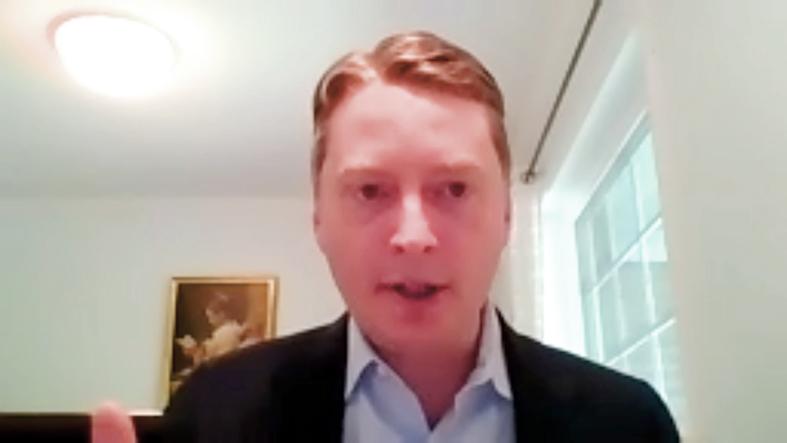Beijing’s non-military coercive actions against Taiwan, such as diplomatic isolation and political interference, are intended to break down the confidence of Taiwanese and might be of greater concern than a military threat, a US foreign policy analyst said on Monday.
In a talk with the New York-based National Committee on US-China Relations, Ryan Hass, a senior fellow at the Brookings Institution, said the US and China are entering an “action-reaction dynamic” over Taiwan, in which both sides believe they are reacting to the actions of the other.
While this has led to increasing talk in Washington about the risk of conflict, Hass said he was more concerned about the “non-military coercive challenge” Taiwan faces from Beijing.

Photo: CNA
In practice, the coercion takes the form of diplomatic isolation, cyberoperations and political interference, which are intended to wear down the psychological confidence of Taiwanese, Hass said.
The end goal of the strategy is to establish that Taiwan “is on its own in dealing with the mainland, and that its only path to peace or prosperity is to welcome the embrace of Beijing,” he said.
To counter these efforts, the US can provide “a steady, clear, firm approach” to Taiwan that remains within the bounds of its “one China” policy, said Hass, who served as director of China, Taiwan and Mongolia policy on the US National Security Council from 2013 to 2017.
It is in the US’ interest for Taiwanese to feel safe and confident in their future, to enjoy dignity and respect on the world stage, and to expand their trade and investment links with others around the world, Hass said.
Meanwhile, the US and China need to have “clear straight conversations” about the intentions of their actions and what they believe they are responding to, rather than relying on intuition, he said.
“The reality is that neither Washington nor Beijing benefits from allowing the situation to spiral out, and neither do the people of Taiwan,” he added.
Ultimately, it is Taiwanese who will be making the decisions about their future, Hass said. “And so the more the burden is on Beijing to provide an attractive offering to the people of Taiwan to try to persuade them about the direction that they would like to see in Taiwan’s future — that’s to everyone’s benefit.”
Despite China’s initial expectations that its relations with the US would improve with the inauguration of US President Joe Biden in January, tensions between the countries have remained high.
Earlier this month, the US Department of State issued new guidelines allowing US officials to interact more freely with their Taiwanese counterparts, while an unofficial delegation sent by Biden visited Taiwan last week.
Coinciding with the US actions, an increased number of Chinese warplanes have been reported flying in the vicinity of Taiwan, while China’s Liaoning aircraft carrier conducted training exercises in waters near Taiwan.

The first two F-16V Bock 70 jets purchased from the US are expected to arrive in Taiwan around Double Ten National Day, which is on Oct. 10, a military source said yesterday. Of the 66 F-16V Block 70 jets purchased from the US, the first completed production in March, the source said, adding that since then three jets have been produced per month. Although there were reports of engine defects, the issue has been resolved, they said. After the jets arrive in Taiwan, they must first pass testing by the air force before they would officially become Taiwan’s property, they said. The air force

The Chinese People’s Liberation Army Navy’s (PLAN) third aircraft carrier, the Fujian, would pose a steep challenge to Taiwan’s ability to defend itself against a full-scale invasion, a defense expert said yesterday. Institute of National Defense and Security Research analyst Chieh Chung (揭仲) made the comment hours after the PLAN confirmed the carrier recently passed through the Taiwan Strait to conduct “scientific research tests and training missions” in the South China Sea. China has two carriers in operation — the Liaoning and the Shandong — with the Fujian undergoing sea trials. Although the PLAN needs time to train the Fujian’s air wing and

The Coast Guard Administration (CGA) yesterday said it had deployed patrol vessels to expel a China Coast Guard ship and a Chinese fishing boat near Pratas Island (Dongsha Island, 東沙群島) in the South China Sea. The China Coast Guard vessel was 28 nautical miles (52km) northeast of Pratas at 6:15am on Thursday, approaching the island’s restricted waters, which extend 24 nautical miles from its shoreline, the CGA’s Dongsha-Nansha Branch said in a statement. The Tainan, a 2,000-tonne cutter, was deployed by the CGA to shadow the Chinese ship, which left the area at 2:39pm on Friday, the statement said. At 6:31pm on Friday,

STRIKE: Some travel agencies in Taiwan said that they were aware of the situation in South Korea, and that group tours to the country were proceeding as planned A planned strike by airport personnel in South Korea has not affected group tours to the country from Taiwan, travel agencies said yesterday. They added that they were closely monitoring the situation. Personnel at 15 airports, including Seoul’s Incheon and Gimpo airports, are to go on strike. They announced at a news conference on Tuesday that the strike would begin on Friday next week and continue until the Mid-Autumn Festival next month. Some travel agencies in Taiwan, including Cola Tour, Lion Travel, SET Tour and ezTravel, said that they were aware of the situation in South Korea, and that group